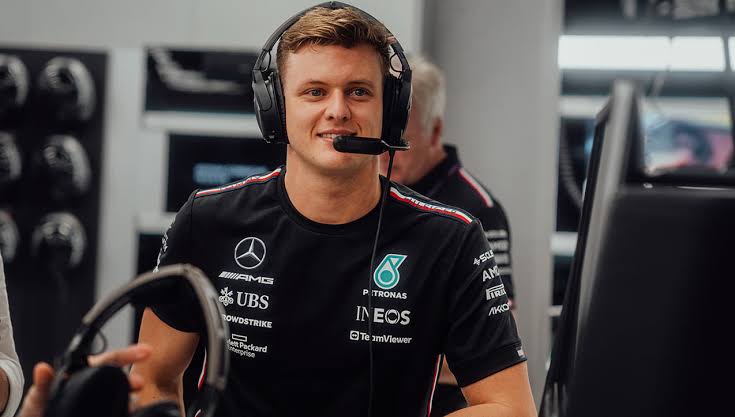
Mick Schumacher, the son of Formula 1 legend Michael Schumacher, has been a polarizing figure in the world of motorsport. After two turbulent seasons with Haas in 2021 and 2022, and a year spent as a reserve driver for Mercedes in 2023, Mick’s future in Formula 1 has been riddled with uncertainty. With news breaking that Schumacher failed to secure a 2025 F1 seat, the young driver has finally broken his silence, pointing fingers at a culture of mistreatment and scapegoating within the sport.
A Promising Career, Dashed by Controversy
Mick entered Formula 1 as a highly anticipated talent, having clinched the 2020 Formula 2 Championship. However, his rookie season with Haas was marred by an uncompetitive car and repeated clashes with team boss Günther Steiner, who often criticized him for costly crashes. The narrative painted Mick as a liability—a label he now says was unfairly thrust upon him.
Speaking in a candid interview, Mick said, “I’ve always tried to be respectful and quiet, focusing on my work. But no matter what I did, they kept pushing me into a corner, portraying me as the problem. I was the easy target for a struggling team.”
Haas and the Public Scapegoating
One of the most controversial aspects of Mick’s F1 journey was his treatment by Haas. Steiner, known for his brash leadership style, publicly aired grievances about Schumacher’s performance, calling his crashes “unacceptable” and questioning his value to the team. While some fans saw this as Steiner’s tough-love approach, others viewed it as humiliating and unnecessary for a young driver trying to find his footing.
“Why was I the only one under the microscope? When the car didn’t perform, it was on me. When we scored points, it was the team. It felt like I was being set up to fail,” Mick revealed.
Mercedes Reserve Role: A Step Backwards?
After parting ways with Haas, Mick found solace as a reserve driver at Mercedes in 2023 and 2024. While working alongside Lewis Hamilton and George Russell allowed him to learn from the best, Schumacher admitted that the reserve role came with its own frustrations.
“Being in the shadows was hard, especially when I knew I could compete if given a chance,” he said. “But even there, I felt like my name carried baggage that wasn’t mine to bear.”
Despite strong backing from Mercedes Team Principal Toto Wolff, Schumacher’s efforts to secure a seat with teams like Williams, Alfa Romeo, and even Audi for 2025 fell through.
F1 Politics: Is Schumacher a Victim of His Legacy?
The Schumacher name is both a blessing and a curse. While it opened doors for Mick, it also came with immense pressure and expectations. Critics argue that Mick has been unable to escape comparisons to his seven-time world champion father, Michael Schumacher.
“I was never just Mick, the driver. I was always ‘Michael’s son.’ It’s an honor, but it also comes with unfair comparisons. I’m not my dad—I’m me. But in F1, they don’t care about that,” Mick lamented.
The politics of F1, which often prioritize sponsorship dollars over talent, may have also played a role. With younger, more marketable drivers like Oscar Piastri and Logan Sargeant coming into the fold, Mick’s brand appeal may have diminished in the eyes of team bosses.
Fans React: Divided Opinions
Mick Schumacher’s revelations have ignited a firestorm on social media. His fans sympathize, blaming Haas and F1 politics for derailing his career. Others, however, argue that Mick never lived up to the hype, with his F1 statistics—zero podiums, zero wins, and only occasional points finishes—failing to justify his seat.
“F1 is ruthless. If you don’t deliver, you’re out. Mick had two seasons to prove himself and didn’t,” tweeted one fan.
On the other hand, another countered, “Mick wasn’t given a fair chance. Look at what he did in F2—he has talent, but no support system in F1.”
What’s Next for Mick Schumacher?
While his F1 future remains uncertain, Mick hasn’t ruled out exploring other motorsport categories like Formula E, IndyCar, or even endurance racing. He remains optimistic despite the setbacks.
“This isn’t the end for me. Racing is my life, and I’ll find a way to prove myself again,” Mick concluded.
As Formula 1 continues to evolve, Mick Schumacher’s story serves as a stark reminder of the sport’s brutal nature. Whether he returns to the grid or finds success elsewhere, one thing is clear: Mick’s battle for redemption is far from over.
Conclusion
The case of Mick Schumacher highlights the challenges faced by young drivers in a sport dominated by politics, expectations, and cutthroat competition. Was he a victim of a toxic F1 culture, or did he simply fail to deliver? One thing is certain: the name Schumacher will continue to spark debate for years to come.






